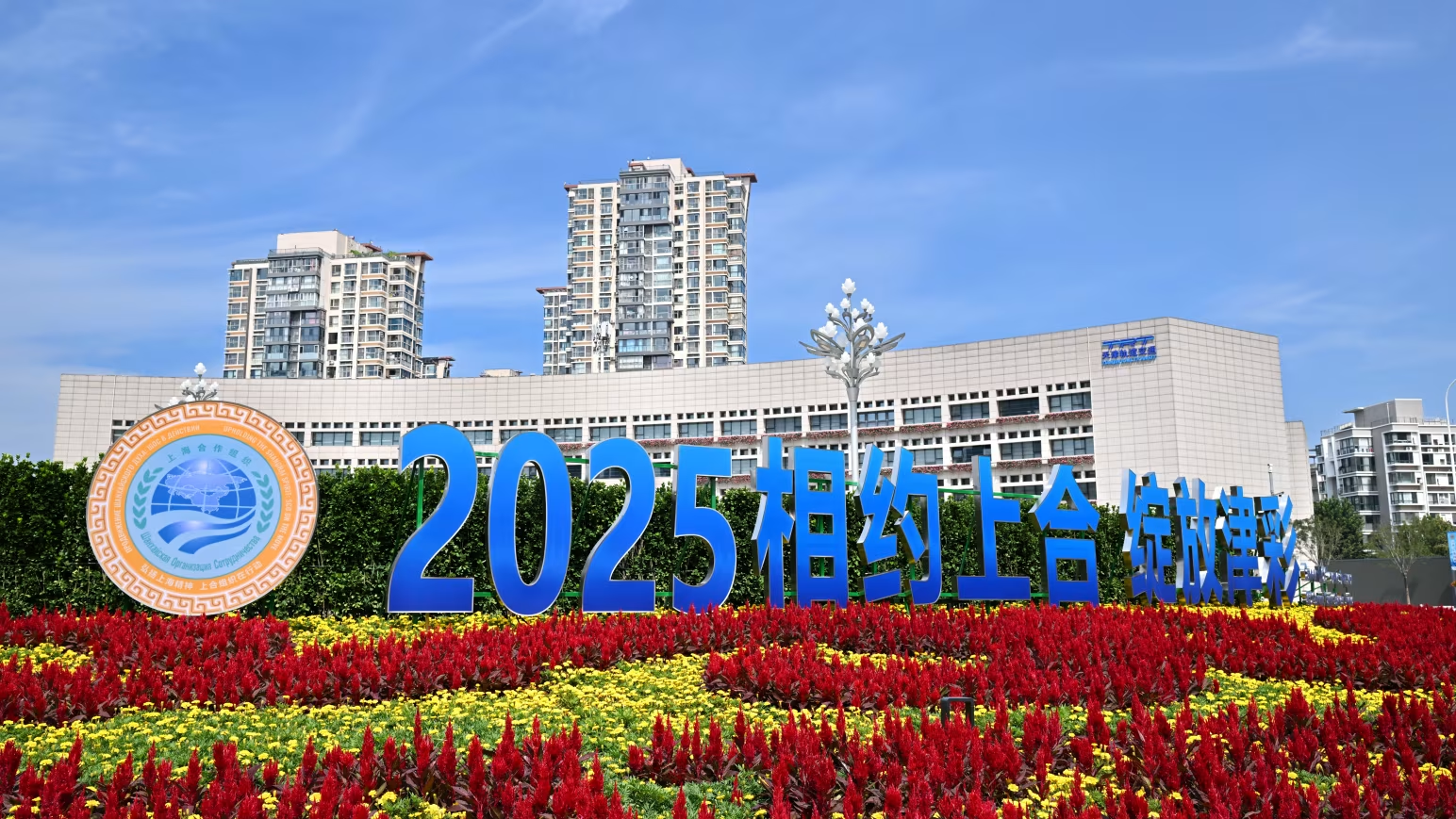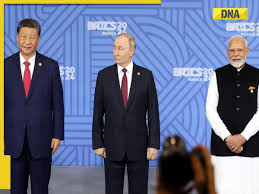
- In a significant diplomatic gesture, Chinese President Xi Jinping has graciously welcomed two of the globe’s most influential leaders—Russian President Vladimir Putin and Indian Prime Minister Narendra Modi. With Xi welcoming both leaders warmly, the geopolitical terrain is experiencing a change in power relationships, largely influenced by the disruptive impact of former U.S. President Donald Trump. Amid shifting international relations, China is taking advantage of the situation to bolster its relationships with two significant allies amidst an uncertain global landscape.
- The summit in Beijing was more than a ceremonial event; it represented a crucial shift in China’s foreign policy. Putin, a reliable supporter of China, and Modi, whose India has traditionally upheld a fragile equilibrium between East and West, are now progressively being pulled into China’s realm of influence. The three nations are collaborating, driven by a shared goal to offset the political and economic supremacy of the United States. The red carpet represents more than a symbol—it signifies China’s increasing desire to establish a new world order.

Xi, Putin, and Modi: A Tactical Coalition Amid Trump’s Worldwide Disruption
- The increasing partnership among China, Russia, and India appears to be a direct reaction to the foreign policies during Donald Trump’s presidency, which caused conventional allies to seek stability. Trump’s “America First” policy estranged numerous countries, disrupting established alliances and transforming global trade patterns. This created an opportunity for China to strengthen bilateral relations with important countries, especially Russia and India, which were at odds with U.S. approaches on trade, defense, and regional security.
- For Putin, China represents an essential ally amidst ongoing Western sanctions and diplomatic seclusion. Their common interest in confronting U.S. dominance serves as a strong unifying element, as Russia and China persist in enhancing their military, economic, and technological collaboration.
- For Modi, the stakes vary to some extent. India has historically upheld a non-aligned stance, aiming to equilibrium its ties with both Western and Eastern nations. Nevertheless, in recent years, China’s growing influence, along with the U.S.’s changing position on international issues, has prompted India to explore closer connections with China. Due to Trump’s unpredictable position on trade deals, tariffs, and international partnerships, India views Xi and China as essential allies in ensuring its economic prospects.
- Although these three countries do not possess a uniform ideological perspective, their common goal of opposing U.S. supremacy in global matters has forged a practical partnership. Through trade deals and military partnerships, China, Russia, and India are reshaping the post-Trump landscape.
- The summit featured high-level discussions on economic partnerships, defense strategies, and multilateral collaboration, conveying a strong message globally: the balance of power is changing. Under Xi’s leadership, China aims to establish itself as the focal point of this new coalition, promoting a multipolar world order that contests the enduring unipolar supremacy of the United States.
The significance of this changing relationship among China, Russia, and India should not be overlooked
- While Trump’s presidency remains a benchmark for worldwide turmoil, Xi’s diplomatic efforts present a different route. It remains to be seen whether this alliance will endure over time or if it will break apart due to conflicting national interests. At present, though, China is capitalizing on its opportunity, acting as both the organizer and creator of a new geopolitical age

‘Architect and host’
The guests at the summit have national rivalries between them and vast differences in political systems. And while this has sparked criticism of the group as too disparate to be effective, it also may serve to underscore Xi’s message.
- “Beijing wants to signal that China is the indispensable convener in Eurasia, capable of seating rivals at the same table and translating great-power competition into managed interdependence,” said Rabia Akhtar, director of the Centre for Security, Strategy and Policy Research at the University of Lahore in Pakistan.
- “The optics are straightforward: China is not just a participant in regional order-making – it is a primary architect and host.”

Indian Prime Minister Narendra Modi and China’s President Xi Jinping attend the BRICS summit meeting in Johannesburg, South Africa, July 27, 2018. Mike Hutchings/Reuters/File
- Modi’s attendance at the gathering also adds heft to Xi’s guest list. The Indian prime minister skipped last year’s summit in Kazakhstan. He now arrives in Tianjin against a backdrop of souring relations with Washington – and as Beijing and New Delhi have moved to ease their own frictions, a nascent realignment that could imperil US efforts to cultivate India as a counterweight against a rising China.
- Delegations are also expected from the SCO’s 16 official partner and observer countries, which include Cambodia, Egypt, Saudi Arabia, the United Arab Emirates, Bahrain, Qatar, and Kuwait, as well as NATO member Turkey, among others, Chinese officials said ahead of the gathering.
- Beijing additionally invited a handful of Southeast Asian leaders. UN Secretary General Antonio Guterres is also expected to attend.
- Across the city of Tianjin, banners in English, Russian and Chinese heralding the gathering lined highways. Officials heavily restricted traffic in the city center as Chinese leaders prepare to welcome their guests with the ceremony and pomp typical of Chinese diplomacy at the highest level.
- The location has pointed symbolism for China, as a port that was forced open by colonial powers in the 19th century, with those from Europe and Imperial Japan receiving land concessions – and a key city occupied by Japan during World War II.
- Some guests, including Putin, Iranian President Masoud Pezeshkian and Pakistani Prime Minister Shehbaz Sharif, are slated to stay for the military parade in Beijing, where the ruling Communist Party will show off its military might and play up its role fighting Imperial Japan as part of the Allied Forces in World War II as the globe marks 80 years since the end of that war.
What is the SCO?
- Since its formation in 2001 as a group focused on regional security cooperation between China, Russia, Kazakhstan, Kyrgyzstan, Tajikistan, and Uzbekistan, the Shanghai Cooperation Organization has expanded in its size and scope.
- SCO members conduct joint counter-terrorism drills, share intelligence on combatting “terrorism, separatism, and extremism,” and work to expand coordination across areas like education, trade and energy. They’re also united in a call for a “just” international order – or one not led by a single superpower and its allies.
- Iran’s inclusion in the group in 2023 and Belarus’ a year later have been widely seen as an effort by Beijing and Moscow to the make the body more explicitly anti-West. It also is one facet of a tightening of bonds between Moscow, Beijing and Tehran that’s raised alarm in Washington.
- Now, growing frictions and uncertainties between some countries and the US under Trump will loom over the gathering – a reality sure to be referenced prominently if indirectly in remarks by Xi to his guests in the days ahead.
- Observers will be watching whether this summit will produce momentum toward further economic integration between member countries, especially when it comes to regional trade or development finance, but expectations for practical developments are low.
- “Without deeply addressing what the mission of the Shanghai Cooperation Organization should be and how it can resolve internal sources of conflict both between members and between members with external countries, the SCO is just a showcase,” said Shanghai-based foreign affairs analyst Shen Dingli.
- Even as the group regularly calls for “avoiding bloc, ideological or confrontational approaches” to addressing security threats, its summits have yet to produce a joint statement mentioning the war in Ukraine.
- SCO – and its lead members China and Russia – also appeared to have little role in de-escalating a four-day conflict between members India and Pakistan earlier this year.
- The group did, however, “strongly condemn” the military strikes carried out by the US and Israel on Iran this past June.


